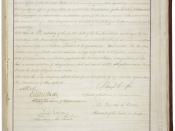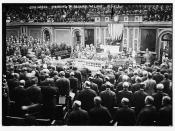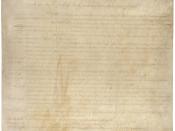It has been two-hundred and nine years since the Bill of Rights was ratified. I doubt that our Founding Fathers ever imagined the changes that would come over our country. Although the Constitution has held up through the years, it cannot be argued that in the last fifty years especially, issues come up daily that seem to test the strength and integrity of our sacred Constitution. The Internet, for example, has caused more controversy than anything we have ever seen. The biggest issue: Censorship. For a number of different reasons, government and other organizations are trying to take our First Amendment right from us by censoring the Internet, but it is up to us to become educated and decide for ourselves if it is helping or hurting.
There are many reasons for the Internet not to be censored. First, it truly is unconstitutional. The First Amendment of the Constitution clearly says, "Congress shall make no law...
abridging the freedom of speech, or of the press...". As far as I'm concerned, this is abridging freedom of speech and press. Although pornography and obscenity are technically not protected by the First Amendment, it becomes a question of, how far will the government go? When do they stop censoring, and how do they decide what is obscene? "The equation is simple: Those who have power get to censor, and those who lack power get silenced. If you find yourself in a position to demand and
get censorship, you can be sure you are among those who have the power, and you are acting to oppress others."
Another reason against censorship is that the Internet is a responsibility. Although a large percentage of the material on the Internet may be harmful and inappropriate, adults should be able to decide what they are exposed to,


